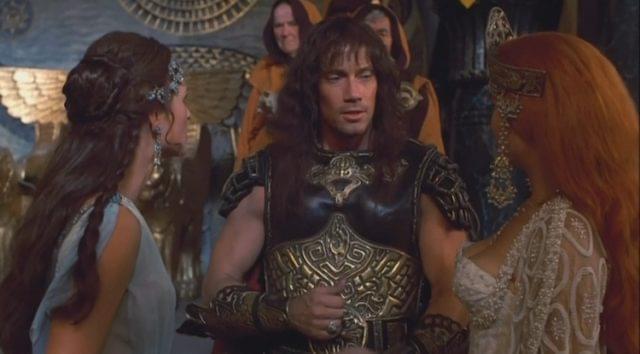
“Kull the Conqueror” answers the question, “How bad does a movie have to be for Arnold Schwarzenegger to turn it down?” For you see, it was originally intended as a third Conan movie (after “Conan the Barbarian” and “Conan the Destroyer”), but Schwarzenegger, who played the sword-wielding, clothing-eschewing barbarian, wanted no part in a third entry. This was the mid ’90s, after all. He was beyond the fantasy silliness and had moved on to more substantive films like “Junior” (where he was pregnant) and “Jingle All the Way” (where he wasn’t funny). If he had made “Conan the Conqueror,” he wouldn’t have been able to appear in “Batman & Robin”! A man must have his priorities.
So it was changed to “Kull the Conqueror,” which was easy, because Kull and Conan were both created by pulp-novelist Robert E. Howard in the 1920s, and Howard was now quite dead, so what did he care if some movie studio wanted to treat his characters as interchangeable? Let’s be honest: One long-haired, sandal-wearing swordsman with a funny name is about the same as any other.
“Kull the Conqueror” is your basic goofy fantasy movie about a dumb hero in a land where everyone has made-up names that sound like they were created by nerdy Tolkien zealots writing “Lord of the Rings” fan fiction. It begins with a narrator telling us that “at the dawn of time, the world was covered in flames, and demons ruled over men.” Sure, sure. Everyone knows that. Then the gods destroyed the demons and left a fire burning to always remind people of the awful “godless times,” because if there’s one thing a healthy society needs, it’s to be constantly reminded of something terrible.
Along comes Kull, played by Kevin Sorbo, who’d been playing Hercules on TV at this point and seemed a natural fit. (Studio executive: “Hercules, Conan, Kull, whatever. Put a loincloth on him and start shooting.”) Kull is a barbarian whose lack of noble blood means he can’t join the kingdom’s official army, for surely only those with the right pedigree have earned the right to slaughter villagers with axes. But then the king goes nutty and starts killing his heirs, whereupon Kull barges into the palace to stop the bloodshed and winds up shedding the king’s blood. (Whoops.) Somehow Kull is now the king. This upsets Taligaro (Thomas Ian Griffith), a bemulleted warrior who had been hoping for the throne himself.
Taligaro and some like-minded traitors figure the best plan is to reawaken the demon goddess, Akivasha (Tia Carrere), which apparently is very easy. You have to wonder why no one thought of it before. Restored from her mummified state to that of a vaguely hot witch, Akivasha promptly beguiles King Kull into marrying her, then poisons him on their wedding night. Now she is the queen. Alarmingly, no one in the kingdom is the least bit suspicious of any of this. Of course, they got behind a king who 1) wasn’t even one of their citizens, and 2) turns out to be quite easily deceived and murdered. So maybe it’s true that people get the government they deserve. It’s a government by the idiots, for the idiots.
But wait! Akivasha has not actually killed Kull! She has merely made it look to the royal doctors (who are idiots, remember) like he is dead while secretly imprisoning him back in her temple. Her decision not to finish the job will surely come back to bite her, just as it always does for villains who choose not to kill their enemies. Will people never learn that murder is always the best answer?
Kull escapes, naturally, and disrupts his funeral (in disguise) in time to prevent the execution of the woman Akivasha framed for his murder. Her name is Zareta (Karina Lombard) and she is one of the royal slaves/concubines. Kull is an honorable man who will not take a woman against her will, however, so they never did the naughty. In fact, if rape is off the table, I’m not sure how someone like Kull ever has sex. At any rate, he likes her, which is why Akivasha was jealous, and now Kull is pretty steamed about the whole thing. “When I get my hands on the b**** demon I will rip out her evil heart!” he declares.
The only way to defeat Akivasha is to acquire the Breath of Valka and use it to extinguish the eternal flame I mentioned earlier. This means Kull, Zareta, and Zareta’s priest brother Ascalante must journey across the ocean of yada yada and through the mountains of blah blah, and so on and so forth, and then there’s a lot of ice, and for some reason Harvey Fierstein plays a mercenary pirate, and a camel pees on Kull, and Kull gets tricked some more, and eventually they get the Breath of Valka and go back to the kingdom to overthrow Akivasha.
Then comes the best part: Akivasha has by now transformed into her true shape, a reptilian monster that looks not unlike the title character in “Alien,” and it turns out the Breath of Valka must be administered orally — which means Kull has to kiss the monster. The movie tells us this is what has to happen, but you figure Kull will find some way around it. Surely the sight of him kissing this big rubbery beast would be too hilarious to feature as the climax of a movie that’s meant to be taken seriously. But nope! He does it! Full on the lips! I think there’s even a little tongue.
Your king, ladies and gentlemen! He usurps thrones in foreign lands, is frequently captured, fooled, and poisoned, lets camels urinate on him, and has no problem making out with hell-spawned demon-beasts! He never does rip out her evil heart the way he promised, either, thus adding to his list of failures. Most disappointing of all: Schwarzenegger’s presence wouldn’t have made this any better.
— Film.com





